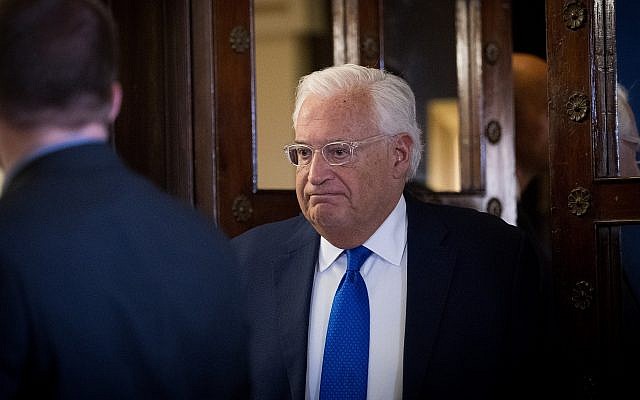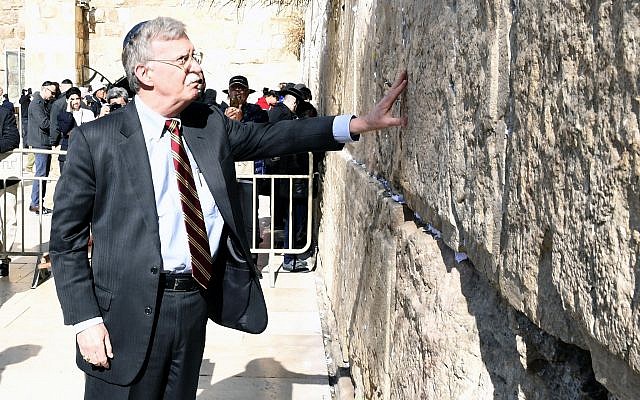David Friedman says April elections not the sole reason for postponement; Washington wants to release plan ‘in way that gives it the best chance of getting a good reception’
By TOI STAFF

US Ambassador to Israel David Friedman in Jerusalem on August 22, 2018 (Yonatan Sindel/Flash90)
US Ambassador to Israel David Friedman said on Sunday that although the Trump administration’s long-anticipated Middle East peace plan is “pretty much completed,” the rollout of the proposal will be delayed by several months.
Israel’s April elections “are a factor, but not the only factor” in the postponement, Friedman told reporters.
The White House wants to release the plan “in a way that gives it the best chance of getting a good reception,” said Friedman, noting that there was still additional “wordsmithing and smoothing” required before it was publicized.
“The challenge to a peace plan is making the case for a much more sober assessment of the realities in this region. The last time there was a meaningful agreement between the Israelis and the Palestinians was 1993. A lot has happened since 1993,” Friedman said, referring to the Oslo Accords.
Friedman made the comments at a press briefing alongside US National Security Adviser John Bolton, ahead of their meeting with Prime Minister Benjamin Netanyahu. Bolton is in Israel to reassure Jerusalem ahead of the Trump-ordered withdrawal of American troops from Syria.
The two US officials on Sunday visited the Old City of Jerusalem, including the Western Wall and adjacent Western Wall tunnels, raising the ire of a senior Palestinian official.

US President Donald Trump’s so-called “deal of the century” for the Middle East, details of which have been scant, was expected to be rolled out in the coming months.
However, a White House official said in December 2018 that the Trump administration was taking the springtime Israeli election into account in planning the unveiling of its Israeli-Palestinian peace plan.
“The upcoming election in Israel on April 9 is one of many factors we are considering in evaluating the timing of the release of the peace plan,” the US official said, hours after Israel’s coalition leaders announced that the national polls would be moved up by seven months.
The plan is unlikely to be welcomed by either side. Israel’s Hadashot TV news suggested last month that the US would likely delay the release of the plan until after the elections, in order not to complicate political life for Netanyahu ahead of the vote with a proposal that would involve compromises by Israel.
It noted, too, that the election date falls two weeks after the pro-Israel AIPAC lobby’s annual police conference, where Netanyahu is a frequent speaker, to audiences of some 16,000 supporters of the US-Israel relationship. His trips to AIPAC usually feature a summit with the US president, and the TV report said Israel’s ambassador to the US, Ron Dermer, would doubtless be seeking to arrange a White House meeting with Trump, which would give Netanyahu a pre-election boost.
In addition to increasing political uncertainty in Israel, the White House must also factor in how the peace plan will be received by the Palestinian Authority, whose president, Mahmoud Abbas, has boycotted the Trump administration since its recognition of Jerusalem as the Israeli capital, and has vowed to oppose the deal.
On November 18, Channel 10 News first reported on a meeting to discuss a possible postponement, citing US officials as saying that Trump wants to see the plan rolled out by February, but that his advisers favor taking a more cautious approach in light of the political crisis engulfing Israel.
At the end of November, Friedman denied that the Washington administration was considering postponing the publication of its peace proposal, saying that the plan will be released whenever it has the best chance of success.
The peace plan will be released when the administration thinks it has “maximized its potential for acceptance, execution and implementation,” the ambassador said in a statement. “Our timing, our strategy and our messaging is — and will be — entirely our own.”
In November 2018, outgoing US Ambassador to the United Nations Nikki Haley called on Israelis and Palestinians to back the US peace plan, saying it was far more “thoughtful” and creative than any that have come before.
Without revealing details of the plan, drawn up by Trump’s son-in-law and special adviser Jared Kushner, Haley said it was far longer than past proposals and included elements that would have previously been “unthinkable.”
“There are things in the plan that every party will like, and there are things in the plan that every party will not like,” said Haley, who was replaced by State Department spokeswoman Heather Nauert.
Haley said that if countries focus solely on parts of the plan that they do not like, “we would return back to the failed status quo of the last 50 years with no prospects for change.”
But, she said, “I assure you there is a lot for both sides to like.”



@ Cathy:
Abbas has only very limited time left on this earth either by natural cause or by help from his Palestinian friends and relatives. He is also not a well man in his mid 80’s
Even if a deal is struck with him who and what replaces him?? It’s not like they are a real constitutional democracy elevating the rule of law as we understand the terms. According to recent Palis Polls if elections on the WST BANK (Y& S) Hamas will win Big.
@ david melech:
Yes that describes them alright but it does not identify Arabs as his descendants….
And even it if did, I wouldn’t believe it anyway.
The Ishmaelites are described as settling right at the borders of Egypt, not in the Eastern Desert beyond Jordan, as the archaeologists say of the Arabs who took over Jerusalem, nor in the Hejaz, as were the other Arabs who fought the civil war with the Jerusalem ones. (they lost and the Jerusalem Arab Caliph took over and controlled both groups.
AND….can anybody answer my query in Chit Chat about…
the meaning of “Seder Venikon”. I’ll lose face with my grandchild if I can’t give the answer……..THINK OF IT…..!
@ Edgar G.:
Re read ‘Genesis 16:12
It doesn’t matter if his Plan is tabled as it is being implemented as we speak. The PA and UNRWA are being destroyed by cutting off their funds. In a month or so, it will be a done deal.
@ broseman:
Surely you don’t believe in that stuff…do you…?? It all looks very nice as part of an unfolding Torah story, but I’m sure that the Arabs only claimed descent from Ishmael because they heard it from some stupid Rabbi in the Middle Ages who didn’t know what he was talking about…and it got them into the Torah, made them “respectable”…in a way… The Torah tales are scenarios about brotherly rivalry, not meant to be anything more.
@ Cathy:
It looks as if you’ve nailed the predicament in this never-ending and frustrating process! When one of the potential signatories to any agreement won’t budge an inch on their unreasonable and unrealistic demands, nothing but failure seems to be on the horizon. But, on a more optimistic note, the Jewish people have been around for nearly 6,000 years – and I don’t think that G-d has any plans to displace them in either the near or distant future! B’H!!
Ismael and Isaac. Esau and Jacob. Quite simple.
They might as well keep postponing this plan until the Moshiach comes, at which time it won’t be needed. Abbas has stated over and over he will not accept any such plan, and the past attempts to forge peace have all been rejected by the Arabs. The PA leaders keep saying they want from the river to the sea, which is all of Israel. Their people will believe this and it will never happen. Besides, even if Abbas could be tempted to sign, his signature is meaningless. He has stated that he will not stop giving money to terrorists, which will prevent Israel from signing. Islam is a culture that doesn’t negotiate and doesn’t give up on the goal to form a world caliphate.